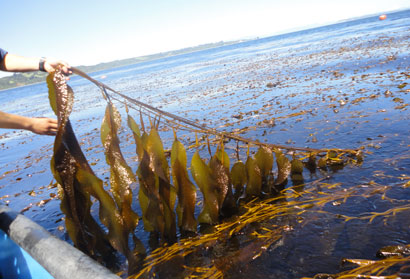
Posted on 01/25/2012 7:49:44 PM PST by neverdem
It may be slimy, slippery and rather unpleasant, but seaweed actually has a surprisingly wide range of uses, being a common source of food, chemicals, medicines and cosmetics. It may soon also be a source of biofuel, thanks to an engineered microbe able to transform seaweed directly into ethanol.
Seaweed has a number of important advantages over other biofuel feedstocks. Unlike maize and sugarcane, it isn't grown on fields that otherwise would be producing food and unlike wood and energy crops, such as switchgrass, it doesn't contain any lignin, which makes the sugar molecules in it much easier to release.
As a consequence, seaweed is garnering an increasing amount of interest as a potential biofuel feedstock, especially in countries with extensive coastlines. Last year, Norway opened its new Centre for Seaweed and Kelp Technology, which will focus on developing ways to generate energy from seaweed.

|
Farming seaweed could be a cheap way to produce biofuel
© Bio Architecture Lab
|
Unfortunately, although it's easy to release sugar molecules from seaweed, it's not at all easy for microbes such as yeast to ferment those sugar molecules into ethanol. Brown macroalgae, a seaweed found all over the world, especially in colder seas, mainly contains the sugars glucan, mannitol and alginate. Yeast can ferment glucan pretty well, but struggles with mannitol and has no luck at all with alginate.
So, scientists at the US advanced biofuel company Bio Architecture Lab set about genetically engineering a microbe that could ferment alginate, which meant endowing it with a daunting list of abilities. As well as being able to produce a class of enzymes known as alginate lysases, which break down alginate into smaller sugar molecules, the engineered microbe also needed to secrete those enzymes into the external environment, where they can interact with the seaweed. It then needs to be able to transport the sugar molecules into its body and ferment them into ethanol.
Fortunately, the scientists found many of the genes needed to perform these feats in a single marine bacteria called Vibrio splendidus, although transferring them over into the laboratory workhorse Escherichia coli proved no easy matter. 'It required multi-gene components comprising over 20 genes,' Yasuo Yoshikuni, lead scientist and founder of Bio Architecture Lab tells Chemistry World. To complete the organism they added a fermentation pathway and deleted some E coli genes that might interfere with the whole process.
Testing this engineered E coli strain on a species of brown algae, Saccharina japonica, the scientists found that it was indeed able to ferment alginate into ethanol. Furthermore, this bacterium also proved better at fermenting mannitol than conventional yeast. As a result, it was able to synthesise ethanol from seaweed at a rate of 0.64g/litre/hour, representing over 80% of the maximum possible yield.
Yoshikuni and his colleagues are now using this engineered E coli as the basis of a commercial production process. The company is currently constructing a pilot plant in Chile, where they already operate four seaweed farms, and expects it to become operational in July.
Science, 2012, 335, 308-313 (DOI: 10.1126/science.1214547)
If they're making money without any subsidies, go for it.
What a waste of good sushi!....
Paging George Nori...
Does this mean that all of our problems are solved?
E. Coli genes?........they better be careful.....
Only if we eat enough uni to preserve the kelp forests...
This could have promise. The key to renewable fuels is to produce the feedstock cheaply, with low overhead and input costs, and on some resource that’s not already being used to produce something more valuable.
*
slimy, slippery and unpleasant smelling - Oh, Nancy Pelosi, Maxine Waters, Cynthia McKinney, and Jim Clyburn.
“STAY OUT OF THE WATER”!
Environmentalists will find a way to have this outlawed.
Stem Cell Treatment for Eye Diseases Shows Promise
Surprising Cells Stymie Sepsis
Brown Fat, Triggered by Cold or Exercise, May Yield a Key to Weight Control
FReepmail me if you want on or off my health and science ping list.
But can Willy smoke it?
I have learned to be very slow about any technology that claims to be “green”, “renewable”, “bio-fuel”, etc... however, this sounds to be a quite promising approach. I hope it works out, and that ethanol can be sold at a cost per unit energy less than gasoline.
That is what I was going to say. If its economical without huge subsidies, then go for it!
wrong seaweed. nori are made from green seaweed.
I know, but I couldn’t resist the Coast to Coast AM pun.
Isn’t common lake algae, the kind so many lakes are overrun with, a good source of biofuel? Seems like there was quite a bit about that several years ago.
BAN FRANKENTHOL!
Just say “NO!” to FRANKENTHOL!
Don’t let Monsanto’s GM Frankenpoison pollute our oceans!
Protect the sea kittens!
/sarc
Send the seaweed to Mooooochelle, she can eat it and loose some weight. Maybe that fat rear would get down to something “normal”......Oh wait, that IS normal for her.
Disclaimer: Opinions posted on Free Republic are those of the individual posters and do not necessarily represent the opinion of Free Republic or its management. All materials posted herein are protected by copyright law and the exemption for fair use of copyrighted works.